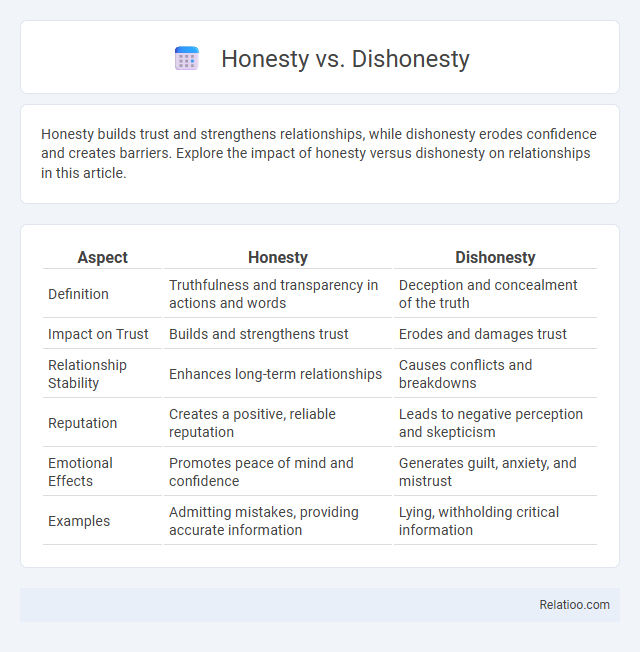Honesty builds trust and strengthens relationships, while dishonesty erodes confidence and creates barriers. Explore the impact of honesty versus dishonesty on relationships in this article.
Table of Comparison
| Aspect | Honesty | Dishonesty |
|---|---|---|
| Definition | Truthfulness and transparency in actions and words | Deception and concealment of the truth |
| Impact on Trust | Builds and strengthens trust | Erodes and damages trust |
| Relationship Stability | Enhances long-term relationships | Causes conflicts and breakdowns |
| Reputation | Creates a positive, reliable reputation | Leads to negative perception and skepticism |
| Emotional Effects | Promotes peace of mind and confidence | Generates guilt, anxiety, and mistrust |
| Examples | Admitting mistakes, providing accurate information | Lying, withholding critical information |
Defining Honesty and Dishonesty
Honesty involves being truthful, transparent, and sincere in your words and actions, fostering trust and credibility in relationships. Dishonesty refers to deceit, lying, or withholding information, which undermines trust and causes harm. Understanding these definitions helps you recognize the value of integrity and the damaging effects of untruthfulness and infidelity.
The Psychological Roots of Honesty
The psychological roots of honesty lie in intrinsic factors such as moral development, empathy, and cognitive integrity, which foster transparent communication and trustworthiness. Research indicates that individuals with strong self-awareness and emotional regulation are more likely to practice honesty, as these traits enable them to resist deceptive tendencies linked to dishonesty and infidelity. Neuropsychological studies also reveal that brain regions like the prefrontal cortex play a crucial role in ethical decision-making and impulse control, reinforcing honest behavior over deceptive or unfaithful actions.
Motivations Behind Dishonest Behavior
Dishonest behavior often stems from motivations such as fear of consequences, desire for personal gain, or avoidance of conflict. Infidelity, a specific form of dishonesty, is frequently driven by emotional dissatisfaction, lack of communication, or unmet needs within a relationship. Understanding these motivations is crucial for addressing the root causes and fostering honesty and trust in interpersonal dynamics.
Consequences of Honesty in Daily Life
Honesty in daily life fosters trust, strengthens relationships, and promotes mental well-being by reducing guilt and anxiety. Your consistent truthfulness encourages open communication and long-term respect from others, creating a positive social environment. Choosing honesty over dishonesty or infidelity minimizes conflicts and builds a foundation of reliability essential for personal and professional growth.
Social and Cultural Perspectives on Dishonesty
Dishonesty, often perceived through the lens of social norms and cultural values, varies significantly across communities and influences interpersonal trust and social cohesion. In collectivist cultures, maintaining harmony may sometimes justify dishonest behavior as a means of protecting group interests, while individualistic societies tend to emphasize personal integrity and transparency. The stigmatization or tolerance of dishonest acts reflects deeper societal beliefs about morality, honor, and the role of honesty in sustaining social order.
Honesty in Professional Environments
Honesty in professional environments fosters trust, enhances team collaboration, and ensures transparent communication vital for effective decision-making. Consistently truthful behavior reduces the risk of conflicts, legal issues, and reputational damage within organizations. Emphasizing integrity encourages accountability and promotes a positive workplace culture that drives long-term business success.
The Long-Term Impact of Dishonesty
Dishonesty erodes trust, a foundational element in any relationship, leading to emotional distance and communication breakdown over time. The long-term impact of dishonesty often results in increased conflict, reduced intimacy, and lasting psychological stress for both partners. Your ability to rebuild trust hinges on consistent transparency and accountability, without which relationships may deteriorate into infidelity or permanent estrangement.
Strategies to Foster Honesty in Relationships
Building trust in relationships requires consistent openness and transparent communication. Setting clear boundaries and expectations helps prevent misunderstandings that can lead to dishonesty or infidelity. You can foster honesty by actively listening, encouraging vulnerability, and addressing issues before they escalate.
Overcoming Temptations of Dishonesty
Overcoming temptations of dishonesty requires cultivating a strong sense of integrity and self-awareness that guides your decisions even in challenging situations. Recognizing the consequences of infidelity and deceit on trust and relationships can motivate you to choose honesty as a foundation for personal growth and mutual respect. Emphasizing transparent communication and accountability helps reinforce ethical behavior and prevent the slippery slope toward dishonest actions.
Building a Culture of Integrity
Building a culture of integrity requires prioritizing honesty over dishonesty and infidelity, ensuring transparent communication and trustworthiness in all interactions. Your commitment to ethical behavior fosters an environment where accountability and respect thrive, reducing the risks associated with deceit and betrayal. Emphasizing consistent moral values helps create a foundation for sustainable relationships and organizational success.

Infographic: Honesty vs Dishonesty
 relatioo.com
relatioo.com